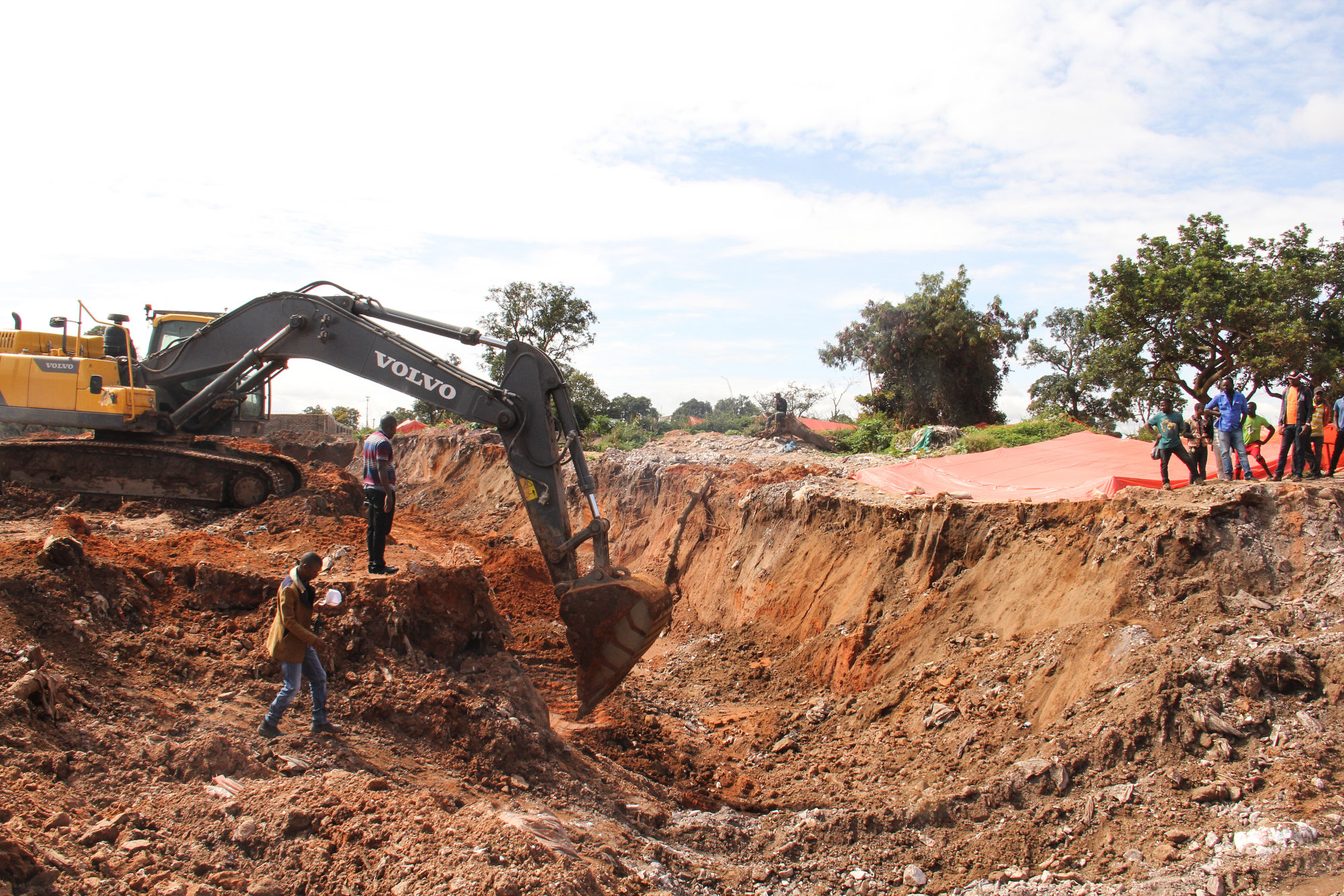The Impact Of Congo's Cobalt Export Ban On Global Supply Chains

Table of Contents
The DRC's Dominance in Cobalt Production and its Geopolitical Significance
The DRC controls a disproportionate share of the global cobalt supply, making it a critical player in the global economy and significantly impacting the geopolitical landscape. Its dominance in cobalt production creates both opportunities and significant risks.
-
The DRC's Outsized Role: The country's mines produce a staggering amount of the world's cobalt, making it the undisputed leader in cobalt mining. This concentration of supply creates a high level of dependence for numerous industries.
-
Geopolitical Instability: The DRC's political instability and history of conflict add layers of complexity and risk to cobalt sourcing. The potential for political upheaval or conflict directly threatens the stability of cobalt supply chains.
-
Power Dynamics: A ban would dramatically alter the global balance of power within the cobalt market, shifting influence to other producing countries and potentially leading to increased competition and price volatility.
-
Ethical Concerns: The ethical concerns surrounding cobalt mining in the DRC, particularly concerning child labor and unsafe working conditions, cannot be ignored. A ban, while disruptive, could force a much-needed reassessment of mining practices and supply chain transparency.
A map showcasing the major cobalt mines in the DRC would highlight the geographic concentration of this crucial resource and the vulnerability of relying so heavily on a single nation. Current production levels fluctuate, but consistently remain above 70% of the global supply. The involvement of multinational corporations in these mines further complicates the geopolitical dynamics.
The Impact on the Electric Vehicle (EV) Industry
The electric vehicle (EV) industry is particularly vulnerable to a Congo cobalt export ban. The widespread adoption of EVs, crucial for mitigating climate change, is directly linked to the availability of cobalt.
-
Battery Dependence: EV batteries are heavily reliant on cobalt, a key component enhancing battery performance and longevity. A cobalt shortage would directly impact battery manufacturing capabilities.
-
Price Increases: A cobalt shortage would inevitably lead to increased battery prices, potentially slowing down the growth of the EV market and making electric vehicles less accessible to consumers.
-
Alternative Battery Chemistries: Manufacturers would be forced to explore and adopt alternative battery chemistries, potentially impacting EV performance (range, charging time), cost, and overall viability. This transition would require significant R&D investment and time.
-
Recycled Cobalt: Increased focus on cobalt recycling becomes crucial to mitigate the impact of supply chain disruptions. However, current recycling infrastructure and technology may not be sufficient to meet the demand.
The different types of EV batteries and their varying degrees of cobalt dependence need careful consideration. Lithium-ion batteries, the current dominant technology, are heavily reliant on cobalt, making them especially susceptible.
Ripple Effects Across Other Industries
The impact of a Congo cobalt export ban extends far beyond the electric vehicle sector. Cobalt's use in various high-tech applications makes its scarcity a concern across multiple industries.
-
Electronics and Aerospace: Cobalt is a crucial component in many electronics, including smartphones and laptops, as well as aerospace components. A ban would directly affect production and pricing in these sectors.
-
Broader Shortages: The scarcity of cobalt would trigger shortages and price increases across multiple sectors, impacting the manufacturing of numerous everyday products.
-
Supply Chain Resilience: Companies will need to significantly enhance their supply chain resilience by diversifying sourcing, implementing risk mitigation strategies, and investing in alternative materials.
-
Metal Price Fluctuations: The impact on cobalt pricing will likely ripple into the markets of other related metals, causing price volatility and uncertainty across the mining and materials sector.
The vulnerability of these diverse industries highlights the systemic risk posed by the DRC's dominant position in cobalt production.
Strategies for Mitigating the Impact of a Cobalt Export Ban
Mitigating the potential impact of a Congo cobalt export ban requires a multi-pronged approach involving international cooperation and technological innovation.
-
Supply Chain Diversification: Diversifying cobalt sourcing to include countries like Australia, Canada, and Zambia is crucial to reduce dependence on a single nation. This requires investment in exploration and mining operations in these alternative locations.
-
Cobalt Recycling: Investing heavily in cobalt recycling and reuse technologies is vital to create a closed-loop system and reduce reliance on primary mining. Advances in recycling techniques are paramount.
-
Responsible Sourcing: Promoting responsible and sustainable cobalt mining practices in the DRC and other producing nations is essential to address ethical concerns and ensure long-term sustainability. This involves rigorous auditing, enforcement of labor standards, and environmental protection.
-
Alternative Materials Research: Developing and implementing alternative battery technologies with lower cobalt dependence, or even cobalt-free alternatives, is a long-term solution requiring significant research and development investment.
These strategies require collaboration between governments, industry, and research institutions to create a more resilient and ethical global cobalt supply chain.
Conclusion
A potential cobalt export ban from the DRC presents a significant threat to global supply chains, particularly impacting the burgeoning electric vehicle industry and various other technology sectors. The consequences would be far-reaching, potentially hindering the transition to cleaner energy and causing widespread economic disruption. Addressing the potential impact of a Congo cobalt export ban requires immediate and comprehensive action. Governments, industry leaders, and researchers must collaborate to diversify sourcing, accelerate the development of alternative technologies, and promote ethical and sustainable cobalt mining practices to ensure a secure and responsible future for this critical mineral. Proactive planning and investment are essential to mitigate the risks associated with a Congo cobalt export ban and ensure the resilience of global supply chains. The future of electric vehicles and many other technologies depends on a stable and ethically sourced cobalt supply.

Featured Posts
-
 Hondas Ontario Ev Project 15 Billion Investment On Hold
May 16, 2025
Hondas Ontario Ev Project 15 Billion Investment On Hold
May 16, 2025 -
 Athletic Club De Bilbao News Analysis And Match Updates From Vavel Usa
May 16, 2025
Athletic Club De Bilbao News Analysis And Match Updates From Vavel Usa
May 16, 2025 -
 Partido Venezia Napoles Donde Verlo En Vivo
May 16, 2025
Partido Venezia Napoles Donde Verlo En Vivo
May 16, 2025 -
 Analisis Del Partido Belgica 0 1 Portugal Resumen Completo
May 16, 2025
Analisis Del Partido Belgica 0 1 Portugal Resumen Completo
May 16, 2025 -
 Broadcoms V Mware Deal At And T Exposes A Staggering 1 050 Price Increase
May 16, 2025
Broadcoms V Mware Deal At And T Exposes A Staggering 1 050 Price Increase
May 16, 2025
Latest Posts
-
 Jimmy Butlers Performance With The Miami Heat A Need For Support
May 16, 2025
Jimmy Butlers Performance With The Miami Heat A Need For Support
May 16, 2025 -
 Jimmy Butler Vs Kevin Durant A Case For Butler Joining The Warriors
May 16, 2025
Jimmy Butler Vs Kevin Durant A Case For Butler Joining The Warriors
May 16, 2025 -
 Did Jimmy Butler Need Help Analyzing His Miami Heat Performance
May 16, 2025
Did Jimmy Butler Need Help Analyzing His Miami Heat Performance
May 16, 2025 -
 Wades Perspective Butlers Exit And The Future Of The Miami Heat
May 16, 2025
Wades Perspective Butlers Exit And The Future Of The Miami Heat
May 16, 2025 -
 Bigface Discount From Jimmy Butler For Warriors Staff
May 16, 2025
Bigface Discount From Jimmy Butler For Warriors Staff
May 16, 2025
